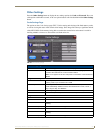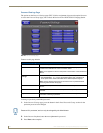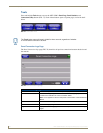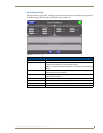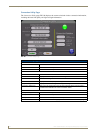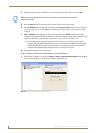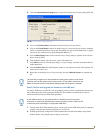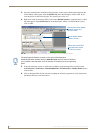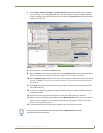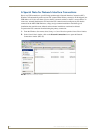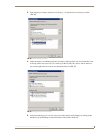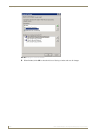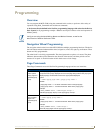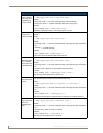
Upgrading Firmware
95
MVP-5200i Modero Viewpoint Widescreen Touch Panel
2. Click the Communications Settings button to open the Communications Settings dialog (FIG. 82).
3. Click on the NetLinx Master radio button from the Platform Selection section.
4. Click on the Virtual Master radio box from the Transport Connection Option section to configure
the PC to communicate directly with a panel. Everything else, such as the Authentication, is greyed-
out because this connection is not going through the Master’s UI.
5. Click the Edit Settings button on the Communications Settings dialog to open the Virtual NetLinx
Master Settings dialog.
6. From within this dialog, enter the System number. The default is 1.
7. Click OK three times to close the open dialogs, save your settings, and return to the main NetLinx
Studio application.
8. Click the OnLine Tree tab in the Workspace window to view the devices on the Virtual System. The
default System value is one.
9. Right-click on the Empty Device Tree/System entry and select Refresh System to re-populate the
list.
Step 3: Confirm and Upgrade the firmware via the USB port
Use the CC-USB Type-A to Mini-B 5-wire programming cable to provide communication between the
mini-USB Program port on the touch panel and the PC. This method of communication is used to
transfer firmware Kit files and TPD4 touch panel files.
1. Verify that the direct USB connection (Type-A on the panel to mini-USB on the panel) is configured
properly, using the steps outlined in the previous two sections.
2. With the panel already configured for USB communication and the Virtual Master setup within
NetLinx Studio, verify that the panel is ready to receive files.
FIG. 82 Communications Settings dialog box
The panel will not appear as a device below the virtual system number (in the Online
Tree tab) until both the system number used in step 7 for the VNM is entered into the
Master Connection section of the System Settings page and the panel is restarted.
A mini-USB connection is only detected after it is installed onto an active panel.
Connection to a previously powered panel causes the panel to reboot, allows the PC
to detect the panel, and assigns an appropriate USB driver.



